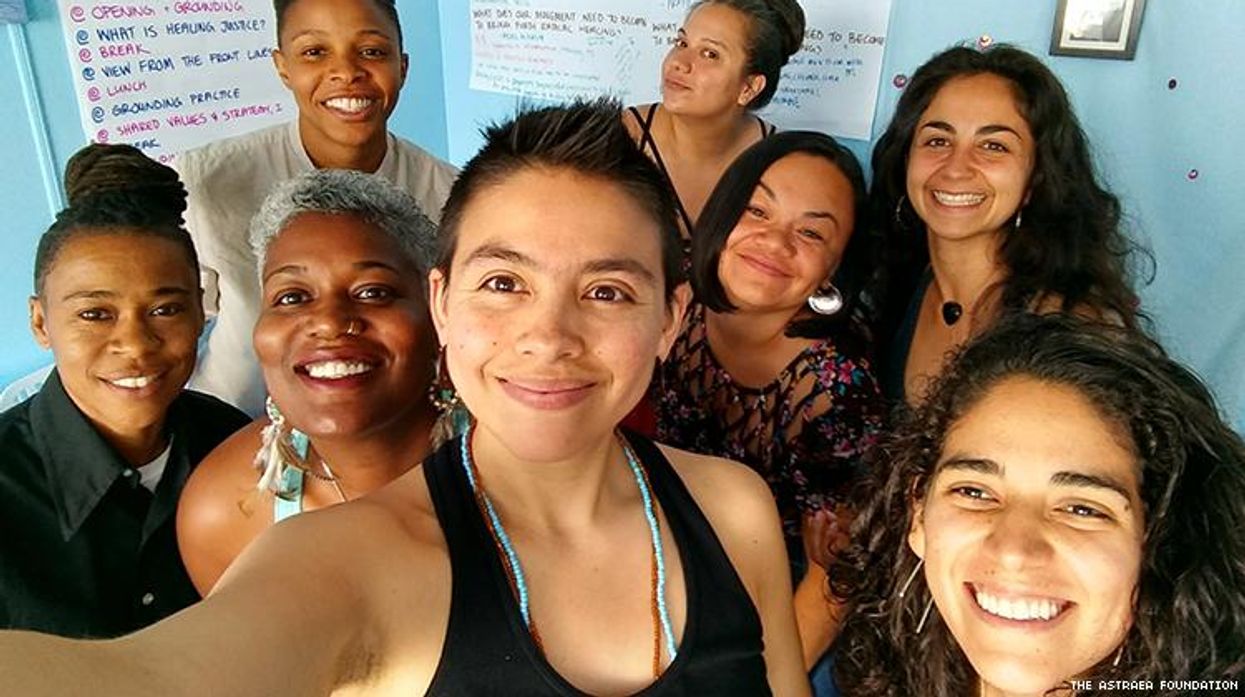Voices
What Is Healing Justice?

The Astraea Lesbian Foundation for Justice explains how we can best respond to generational trauma and violence.
May 16 2019 6:31 AM EST
By continuing to use our site, you agree to our Privacy Policy and Terms of Use.

The Astraea Lesbian Foundation for Justice explains how we can best respond to generational trauma and violence.
Midway into Trump's first presidential term, people who support grassroots resistance organizing are searching for ways to sustain the resilience and safety of movements, especially those led by people targeted by the administration -- immigrants, people of color, and LGBTQ people.
Over the last two decades, there has been an increase in activist-led movements recognizing the impact of generations of trauma, systemic violence, oppression and war on their communities.
Francisca Porchas Coronado is one of the leading voices against deportations and immigrant detention, an anti-racist organizer with over 15-years experience, and a visionary in healing-based organizing. "Trump has been very disorienting for our movements," Porchas says.
"We are not clear on where the opportunities are to win or even to stop anything. That is a very hard place to be morally. Family separation was a hard blow. But we aren't the only movement in history who's asked, How are we going to get out of this onslaught of possible devastation?"
In 2017, Porchas founded Healing In Resistance, a wellness project centering the spiritual and emotional wellbeing of immigrant communities in the fight against criminalization. She also hosts the La Cura Podcast with Mijente, a digital and grassroots hub for Latinx and Chicanx movement building and organizing, and has been initiated into the ancient, indigenous Yoruba tradition of IFA for over a decade and is currently a priestess in training.
Porchas says, "This is a time where healing work can remind us that in these moments we care for each other. We build each other up morally and spiritually. I built a collective of healers and our folks have been tending to our people. There are healing circles, emotional literacy classes and basic care like acupuncture. We have healers saying, We are here. We care for you."
"And while we take care of each other, the organizing doesn't stop. I never could have dreamt that Abolish ICE as a rallying cry was going to spark people's imagination. We need to continue organizing and focus on the issues that have caught fire. We have to figure out how to resource this work, particularly when funders focus so much attention on how you're going to win."
In 2006, the Kindred Healing Justice Collective, a network of political healers, health practitioners and organizers in the U.S. Southeast, began using the term "healing justice" as a framework to identify how we can holistically respond to and intervene on generational trauma and violence.
These Southern organizers -- Black, Indigenous, women of color, LGBTQI and allies -- connected the reality of generational trauma to the ongoing histories of slavery, genocide, and economic disenfranchisement based on the slave labor economy and colonization.
The Astraea Lesbian Foundation for Justice, the only philanthropic organization working exclusively to advance LGBTQI human rights around the globe, sat down with some funders and organizers to create the first-ever publication on how people can support healing justice as an effective strategy to build the power of movements at this time.
Some of the learnings highlighted in the report are:
Healing justice needs to be centered. We can't separate the traumatic impact of state violence from our strategies to build collective power towards abolishing that violence.
The healing justice framework lifts up resiliency and survival practices that center the collective safety and emotional, physical, spiritual, environmental and mental wellbeing of communities.
For a deeper understanding of healing justice work, read The Astraea Foundation's recently released report here.
The Astraea Lesbian Foundation for Justice is the only philanthropic organization working exclusively to advance LGBTQI human rights around the globe. They support grantee partners who challenge oppression and seed change.
Charlie Kirk DID say stoning gay people was the 'perfect law' — and these other heinous quotes